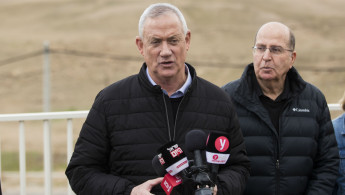Israel opposition leader Benny Gantz vows to annex Jordan Valley despite international condemnation
Benny Gantz - chairman of the Kahol Lavan (Blue & White) alliance and Netanyahu's main electoral challenger - said that he would work on the Jordan Valley's annexation after the March 2 election.
"The Jordan Valley is Israel's eastern defensive barrier in any future conflict," he said during a tour of the region. "Israeli governments that spoke of the possibility of returning the area [to Jordanian control] were making a grave strategic and security mistake, and we see this strip of land as an inseparable part of the State of Israel."
Asked about the Trump administration's "Deal of the Century", Gantz responded: "I hope that President Trump will hurry and release his plan. Several weeks have passed."
"Many dramatic things are happening in the Middle East, and I'm looking forward to the plan's release."
Gantz opposed the publication of Trump's peace plan during the election campaign, calling it "outright intervention".
"After the elections, we'll work toward applying sovereignty over the Jordan Valley. We'll do this in a move agreed on nationally and in coordination with the international community," Gantz was quoted to say by Hebrew-language outlets.
Israeli Prime Minister Benjamin Netanyahu responded to Gantz's comments by daring him to annex the region, which is mostly populated by Palestinians.
"Why wait until after the elections if it is possible to apply sovereignty over the Jordan Valley already with a broad agreement in the Knesset? Benny Gantz, I expect your answer this evening, unless [Joint List MK] Ahmad Tibi vetoed you," Netanyahu said.
 |
| Tens of thousands of Palestinians live in the valley [Getty] |
The Likud Party leader had previously expressed his intention to annex Jordan Valley, prompting mass outcry by Arab nations.
Last year he pledged to apply for Israeli sovereignty over the Jordan Valley and northern Dead Sea if he returned to office.
Palestinians called the move "illegal", and the UN said it would put a swift end peace talks. Chief Palestinian negotiator Saeb Erekat said the proposal would "bury any chance of peace".
UN chief Antonio Guterres warned late last year that Netanyahu's plan to annex a key part of the occupied West Bank would violate international law.
"Such steps, if implemented, would constitute a serious violation of international law," Guterres' spokesman Stephane Dujarric said in a statement.
"They would be devastating to the potential of reviving negotiations and regional peace, while severely undermining the viability of the two-state solution," he said.
Officials in Jordan and Saudi Arabia had similarly condemned the plan.
Israel is gearing up for its third election in less than a year after neither Prime Minister Benjamin Netanyahu nor his centrist challenger Benny Gantz were able to form a majority government following two polls last year.
Whoever is tasked with forming a government will need to win the support of small parties, which can wield major clout in coalition negotiations.
Under Israel's system of proportional representation, parties may form joint electoral lists to boost their chances of being selected as coalition partners.
The headline has been changed to correct an earlier mistake suggesting Mr Gantz is a government minister. The New Arab regrets the error.
Follow us on Twitter and Instagram to stay connected





 Follow the Middle East's top stories in English at The New Arab on Google News
Follow the Middle East's top stories in English at The New Arab on Google News


